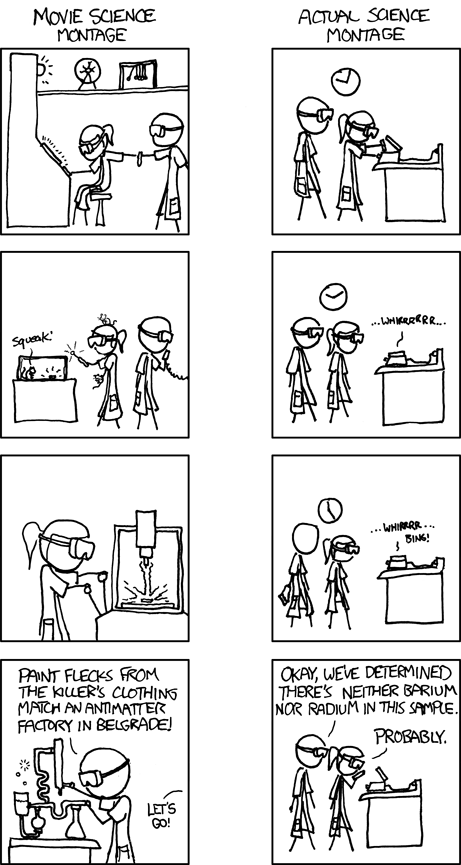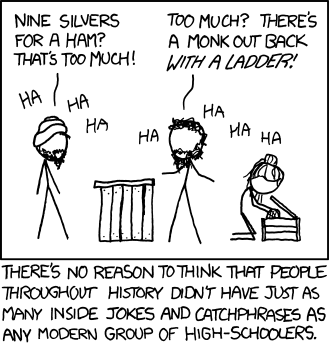I'm taking a Gender Women's Sexuality Studies (GWSS) class this semester, which focuses on science studies and feminist theories of science. Two things that I didn't know existed until a month ago, and I sort of wish I was still ignorant of. So far, everything we've read and discussed in class has been focused on criticizing the current practice of science, which is fine, nothing is above criticism, but the singular focus of the material on science as a monolithic, patriarchal institution that is bent on the oppression of everyone who is not a white male does bother me. It just seems so academic; divorced from the actual practice of science, written by people who spend their days coming up with problems that don't necessarily exist to justify their existence as a field. Kind of like mathematicians.
This is probably an overly harsh sentiment, and I am biased towards science, but the way that these writers talk about science really bothers me. They discuss it as if it were an over arching institution of Science with a capital "S." As if it were one singular thing that can be quantified and discussed. This just isn't true.
 |
| XKCD |
Science isn't a singular thing. It isn't a uniform institution for the discovery of the Truth About the Universe, or even a single way of looking at the world. At its core, science is just a tool: a process that can be employed to help us make sense of the world around us. No single person or theory or institution can accurately represent science, because, ultimately, science is just a concept, a method.
Science is in the experiment, in the questions we ask about how our world works, and in the data that we collect about it. What we make of those results is about us, and our knowledge and world view, not about the science of it. This is where the critics we have been reading have a point. The place we come at the data from does influence how we interpret it, but we are human after all, and it is unfair to blame science itself for the inevitability of human nature. People can be racist and sexist and homophobic, and thus they way they interpret their data can be all of those things, but that's not the fault of the method, that's the fault of the person.
You wouldn't say that someone once wrote a racist novel, therefore the way in which novels are written must be inherently racist and needs to change. That doesn't make sense. But that's what feminist science studies is saying in many respects. Science has been used to justify sexism, therefore science is inherently flawed. That doesn't mean anything, really. It doesn't do anything to advance the feminist cause to yell at science to change, when really you should be yelling at the people who practice science and the people who misinterpret science to change.
Intersectionality is really important in a lot of the feminist theory we've been reading. It is basically the idea that people are composed of a bunch of different identities and we need to acknowledge all of them to really understand where a person is coming from (which I think is kind of obvious, but I'll let them have that.) The overwhelming opinion of the class is that science would be better off if it took a more intersectional approach, because it would better equip science to find the truth. I'm sorry, but what? I can understand that you're a black woman with an interest in slow jazz and Asian culture, but that doesn't change gravity, or photosynthesis, or the equilibrium constant of an acid-base reaction. Science is the interpretation and understanding of how the world works, and the world works based on a finite set of physical and chemical laws and principles, not on you're identity, no matter how complex it may be. If, when you are analyzing scientific data, you are thinking about your intersecting identities, YOU ARE DOING IT WRONG. (Granted, this doesn't apply to the social sciences, but, as important and valid as those fields are, I don't personally consider them science).
Yes, the institutional practice of science has its flaws. It is definitely very male dominated, and it can be hard to break into and understand as an outsider. It is slow to change, and often, there are no clear results due to ambiguity in the data and conflicting evidence. Politics also plays an important role is what is funded and what is enshrined as law. But those are problems with the practice of science, not with science itself. Nothing is perfect, and science has its problems and issues and controversies like every other field, but I don't agree with the characterization of it as a single oppressive unit, particularly since that characterization tends to be based solely on examples taken from the biological sciences, which aren't representative of even institutional science as a whole.
Biology is inherently one of the most subjective fields within the natural sciences because the systems are so far removed from the first principles, which necessitates more subjective interpretations, which are more open to the influences of one's own philosophies. To only look at biology and then to draw conclusions about the way science is practiced as a whole, is even more flawed than just trying to make broad generalizations. It displays a fundamental lack of understanding about the fields being criticized.
 |
| XKCD again |
All of this isn't to say that I'm against feminism, which I'm not, I just have a problem with some of the theory. Writing about your problems with science is not going to change anything, particularly since the only people reading feminist theory are other feminist theorists. If you want to actually change things, stop pandering to your academic peers, and start going out and doing things. Science doesn't oppress people; people oppress people, and theorizing about that oppression doesn't stop it. Also, if you are going to theorize about something, try and start by having a basic understanding about what you are talking about.
For the sake of sourcing what I'm ranting about, here are some of the authors who I'm referencing:
Carolyn Merchant, Evelyn Fox Keller, Barbara Ehrenreich, Deirdre English, Emily Martin, Nancy Tuana, Lisa Weasel, Siobhan Somerville, Banu Subramanium, and other.

















